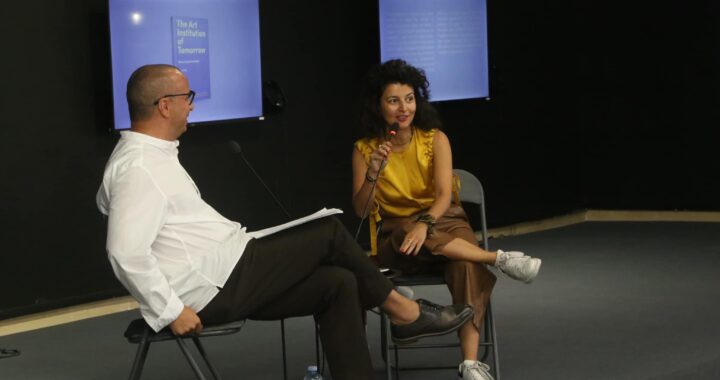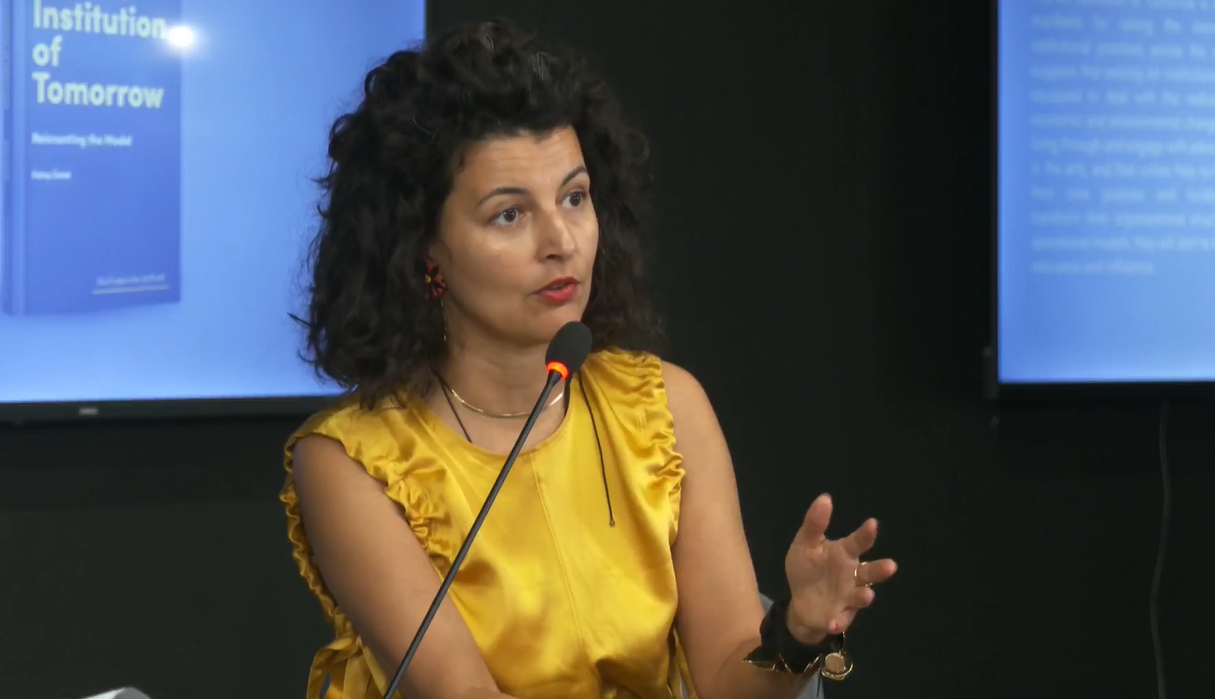

 Fatos Üstek, UK based curator and writer presenting her latest book: “The Art Institution of Tomorrow: Reinventing the Model,” at Reporting House on September 6 in Prishtina, Kosovo. Photo: BIRN
Fatos Üstek, UK based curator and writer presenting her latest book: “The Art Institution of Tomorrow: Reinventing the Model,” at Reporting House on September 6 in Prishtina, Kosovo. Photo: BIRN
Renowned UK-based curator Fatos Üstek presents her latest book for the first time in Prishtina, exploring the crisis of art institutions amidst global challenges.
Fatos Üstek’s path through the world of contemporary art is defined not only by the projects she leads, but also the quiet confidence with which shemoves between disciplines, ideas, and spaces.
On September 6, renowned UK-based leading curator Fatos Üstek visited Kosovo for the first time to present her latest book: “The Art Institution of Tomorrow: Reinventing the Model,” at Reporting House in Prishtina.
“The reason I wrote this book after running two institutions and after really being embedded into the institutional framework internationally, [is because] art institutions are stagnating. The levels of their stagnation are different but in crossroads of having an internal crisis,” she said during her talk moderated by Gazmend Ejupi, the curator at Reporting House.
“The world is in crises, as in plural form, and the fact that we have crises in soil, health, energy, climate, and politics is clouding the fact that the art institutions are having an ontological crisis,” she explained.

“Ontological in terms of: what is the purpose? Who are we serving? Why are we doing what we’re doing? How do we make decisions? I think there is a huge confusion at the moment, and that is because what is going on in the world is impacting the art institutions,” she added.
During this discussion which gathered artists, curators, journalists, students, and civil society organizations in Prishtina, Üstek argued that art institutions need to undergo significant transformation to remain relevant in an era of radical social, economic, and environmental challenges.
Üstek, who has worked internationally from the UK to Korea recently, commented on the art model that Reporting House represents, referring to the similarities with the biennale’s models, which serve to reflect on social awareness of societies on conflicts or their realities.
“The biennale format that in a way started the Avant-Garde in contemporary art because the biennales were the platforms that were socially aware practices, and practices… such as factual journalists’ materials [were used]. For example, the Gwangju Biennale started because of the Gwangju uprising, which ended up with the killings of thousands and thousands of people. Since 1995, every edition of the Gwangju Biennale has reflected a reality of what is happening around the world, not only in the region,” explained Üstek.
The leading curator also presented some of the reasons behind her success as a curator and critical voice in contemporary art, referring to her approach to each encounter, whether an artist, a city, or a concept, with an openness that feels both effortless and profound.
“When I was appointed to deliver 50 exhibitions [in 50 weeks], and it was 2015, I really thought I needed to kind of respond to the potential of the times. London as it was in 2000 was no longer the place. There were, at that time, 138 contemporary art galleries, really functioning successfully; there was modernism, there was freeze, and London was in a different framework. It was a mammoth task,” she explained, talking about her work on fig 2.
“For me, as a curator, I am very much interested in challenging myself and pushing myself forward, so I gave myself obstructions. I wanted to work with artists that I’ve never worked with before in these 50 exhibition projects, and I also wanted to discover artists that I didn’t even know that their practice existed,” she explained.
As a former student of mathematics, Üstek strived to become a sought-after voice in both artistic and academic circles through the arts, promoting a multidisciplinary approach in the arts.
In this regard, she emphasized the role of the art institutions and the need for a new institutional approach to contemporary art.
While asked what approach should Kosovo’s art institutions follow in terms of responding to the current social needs, Üstek mentioned the role of the institutional structure and autonomy as crucial to ensure a better environment for art development.
“I think it is a blessing that you don’t have a Museum of Contemporary Art, and this is going to be established because you can start new. The reason I also wrote this book is because I talk about how people could transition into the new framework of ‘distribution thinking,’ but because you don’t have the structure you have actually an immense chance to build your own structure and this is a real privilege,” she stated.
“I think it would be important to honor the concept of autonomy. How could our public institutions have autonomy, as I mentioned earlier financial, social, and political autonomy? I think you need to be able to generate ideas that define the common expectations.”
Participants had the opportunity to engage with Üstek’s vision for the future of art institutions and participate in a Q&A session.
17 October 2024 - 18:02

Internews Kosova launched “Traces of Discrimination,” a documentar...

Journalistic documentation of Kosovo’s civil resistance in the 1980s...

As part of its second Reporting House museum, BIRN is chronicling the ...

Once built to protect lives during war and natural disasters, two conc...